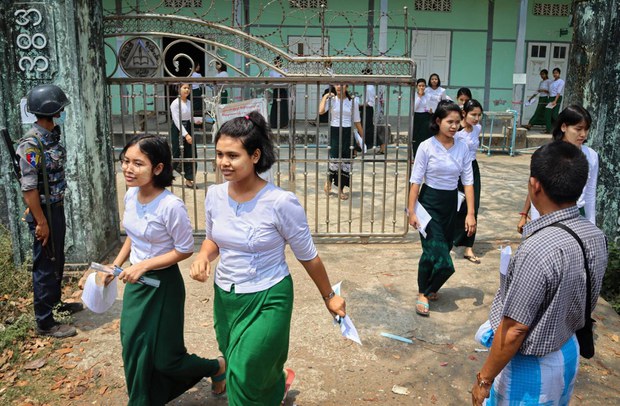Security concerns led to a dramatic decline in the number of students who registered for the first university entrance exams in Myanmar since the military coup, sources said Thursday, citing ongoing unrest and armed conflict in the Southeast Asian nation.
The junta’s Ministry of Education said that only 312,299 students had signed up for the exams during the 2021-2022 academic year.
The number represented a decrease of more than two-thirds from two years earlier, when 970,759 students registered. It also marked the first decline in registrants in at least seven years, when 632,314 students took the exams in 2014-2015 — a drop from the previous term but a number that is still twice as large as in 2021-2022. Exams were cancelled during the 2020-2021 academic year due to COVID-19 school closures.
This year’s exams, which are scheduled to run until April 9, are being held amid daily anti-junta bombings and public unrest throughout the country, and reports have emerged of the military blocking access to test sites.
A Yangon-based student who took the exam said parents are no longer allowed to wait for their children in front of test centers as in previous years.
“There was a large presence of soldiers and police outside,” she said, adding that students “just gave the answers to the exam questions quickly and left.”
Aung Kyaw, deputy permanent secretary of the Ministry of Education, told RFA that security measures had been strengthened to allow testing to proceed.
“We have coordinated with the health department and the security department,” he said. “All of our education ministry staff are also kept on standby. They are performing their duties. Security measures are in place and teachers have been working nonstop.”
The testing marked the end to a trying academic year. In addition to the coup, schools had to contend with a COVID-19 outbreak that forced their closure for four months. When they reopened on November 1, many students did not return, both in protest of military rule and out of fear that they could be the subject of an anti-junta attack.
In Kayah state, where the military has encountered staunch resistance since launching offensives against armed ethnic groups and prodemocracy People’s Defense Force (PDF) paramilitaries, only 780 students had registered for this year’s matriculation exam. Since the coup, fighting in the region — which is home to around 290,000 people — has displaced more than 100,000 civilians, including many students.
Soe Mya, a student from Ngwedaung village, in Kayah’s Demawso township, told RFA she had to flee her home due to the fighting and was forced to miss the exam.
“Before the coup, I was ready to graduate and continue my schooling. My parents had made accommodation arrangements for me, and I had completed all of the necessary tutoring,” she said.
“Of course, I want to go to school when I see others going. But it wasn’t possible to apply for this exam as we’re currently on the run and sheltering in the jungle.”
Soe Mya said she had seen far fewer students taking university exams this year than in previous ones —particularly in Demawso, where clashes had occurred as recently as Thursday morning.
Boycotts of military-run schooling
Some parents RFA spoke with said that they had simply refused to allow their children to attend school or sit for exams in protest of the military-run education system.
“Many schoolteachers are taking part in the [Civil Disobedience Movement] to protest the junta and we don’t like the teachers who replaced them,” said Khin Than Nu, a mother from Sagaing region, who said she had chosen to homeschool her children.
“We will continue their education when the country is at peace. In the meantime, there are many vocational training courses available on the internet and my children are also learning English online.”
According to the Ministry of Education, Rakhine state had the highest registration rate of students for the academic year at 45,592, followed by Yangon region with 37,560, and Mandalay with 37,202. Kayah state’s 780 registrants was the lowest of any region.
Parents told RFA that despite the number of registrants, they expect the actual number of students who take this year’s university exams will be lower.
When asked how many students had taken the exam on Thursday, a Ministry of Education official told RFA he did not know the exact number.
Copyright © 1998-2020, RFA. Used with the permission of Radio Free Asia, 2025 M St. NW, Suite 300, Washington DC 20036.







